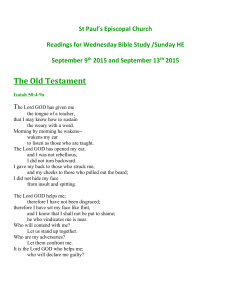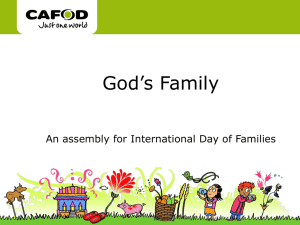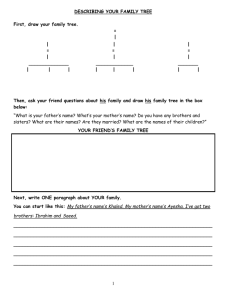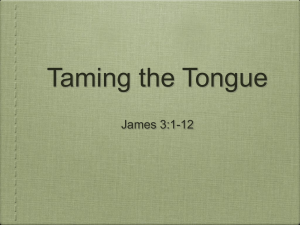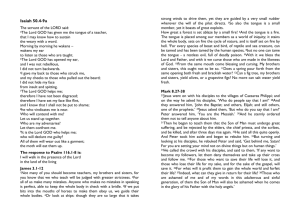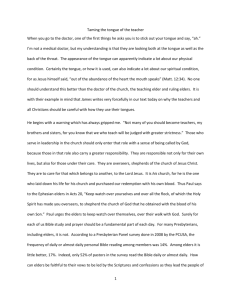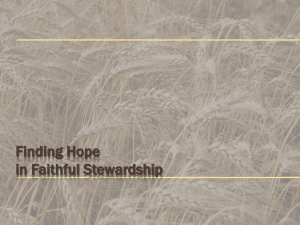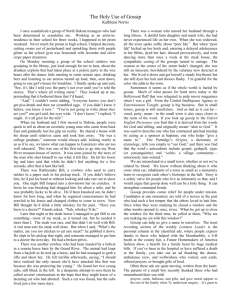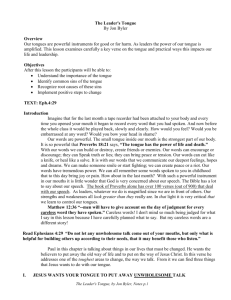Here - St. John United Church of Christ, New Athens IL
advertisement
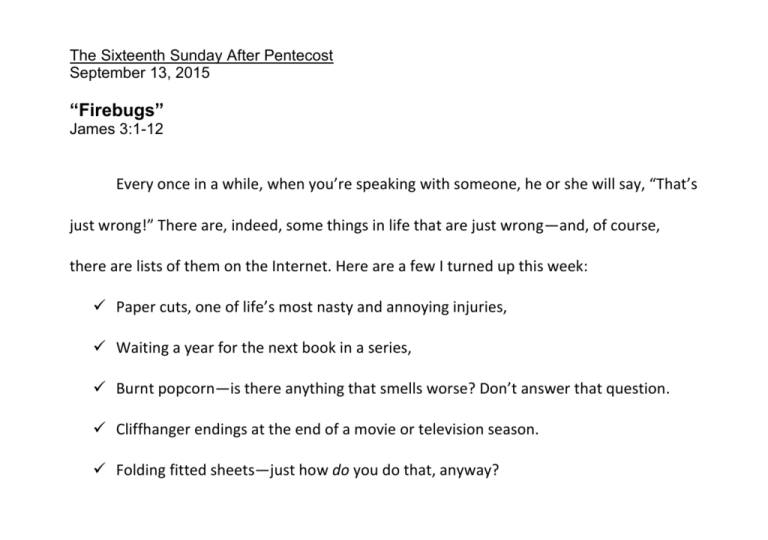
The Sixteenth Sunday After Pentecost September 13, 2015 “Firebugs” James 3:1-12 Every once in a while, when you’re speaking with someone, he or she will say, “That’s just wrong!” There are, indeed, some things in life that are just wrong—and, of course, there are lists of them on the Internet. Here are a few I turned up this week: Paper cuts, one of life’s most nasty and annoying injuries, Waiting a year for the next book in a series, Burnt popcorn—is there anything that smells worse? Don’t answer that question. Cliffhanger endings at the end of a movie or television season. Folding fitted sheets—just how do you do that, anyway? “Firebugs” One list used, not words, but pictures. That’s just not right. Or, as James put it in today’s Scripture lesson, “Brothers and sisters, it just shouldn’t be that way!” Of course, James had more on his mind than a paper cut or a poorly slice piece of pizza. People can tame and already have tamed every kind of animal, bird, reptile, and fish. No one can tame the tongue, though. It’s a restless evil, full of deadly poison. With it we both bless the Lord and Father and curse human beings made in God’s likeness. Blessing and cursing come from the same mouth. My brothers and sisters, it just shouldn’t be this way! Let’s start with one of the most common and noticeable misuses of the human tongue—cussing. 2 September 13, 2015 As any of the teachers at New Beginnings can tell you, children are learning how to cuss at younger and younger ages. Surveys bear this out, saying children are swearing more often than children did just a couple of decades ago. “Swearing really takes off between ages three and four,” one researcher said. Where, pray tell, are the youth of America learning such foul, indecent language? Don’t blame TV, movies, or the Internet. Young people are busily enlarging their naughty vocabulary using the foul mouth dictionary that is their parents’ every day conversation, the same parents who, out of the other side of their potty mouths, tell their kids, “I don’t want to hear you talking like that!” 3 “Firebugs” What’s the big deal? After all, even among people who do cuss, cursing makes up just .3 to .7% of our daily speech. Still, it’s just words. As the old saying goes, “Sticks and stones may break my bones, but words will never hurt me.” Anyone who’s ever been on the receiving end of a good tongue lashing knows just what a load of horse hockey that is. Words can and do hurt us. For James, the power of words goes even deeper. Words, he says, have the power to create or destroy God’s world, to build up or destroy God’s word of truth. 4 September 13, 2015 “The tongue itself,” James says, “is set on fire by the flames of hell.” The words we speak can be a tool of the great deceiver himself, one that we use to tear down our family, friends, neighbors, and fellow members in the body of Christ. Years ago, one of our student pastors—I forget which one, honestly—said to me, “You preach about gossip a lot. Why is that?” How do you explain the power of gossip in a small town to someone who’s never experienced it? Words fail, but maybe this clip from the old Andy Griffith Show will help. Video 5 “Firebugs” Would you like every word you said about someone else broadcast to the whole village? We can so easily and, often, unthinkingly, upset someone with the words we say. Gone are the days of the small town paper, of talking over the back fence, or listening in on party lines. Today, gossip and the hurtful power of words have been taken to a whole new level. A few years back, in 2011, the New York Times carried a story set in, of all places, the small town of Mountain Grove, Missouri. Folks there were using the website TOPIX to mercilessly—and anonymously—cut down their fellow town members. 6 September 13, 2015 In Dee’s Place, a local restaurant, one waitress said that the site had caused both fights and divorces. The diner’s owner called it a “cesspool of character assassination.” Hearing the Times reporter asking questions, Shane James, the cook, came out of the kitchen. He said that his wife Jennifer had been the target of a post titled “Freak.” It described the mother of two as among other things, “a methed-out, doped out, whore with AIDS.” Not a word of it was true, but the consequences were real enough. Friends and relatives stopped speaking to them. Trips to the grocery store were met with silence and stares. Mrs. James went into a deep depression and even considered 7 “Firebugs” suicide. Now, the couple is moving. As Mrs. James put it, “In a small town, rumors stay forever.” The more something is repeated, true or not, the more power it takes on, until it can, in fact, overwhelm the truth. Think about that the next time you’re ready to cut down a neighbor, pass along a juicy piece of negative gossip, or flay someone alive in the cyberspace arena of Facebook or Twitter. 8 September 13, 2015 There’s no getting around the fact that these verses from James are overwhelmingly negative when it comes to the power of our words. I mean, seriously, how much worse can it get than to say the tongue is set on fire by the flames of hell? What we have to remember, you and I, is that while our words have the power to destroy, they also have the power to strengthen, encourage, and build up. Maybe we remember the words of a parent who reminded us that we were still loved and assured us that the sun would rise again after we were dumped by our first boyfriend or girlfriend. Many of us have had a mentor who saw our talent and ability when 9 “Firebugs” we did not, and encouraged us along. Even after being married many years, hearing a spouse say “I love you” can still make our day. God calls us to be people like that for others. When we come together on a Sunday morning, joining our voices in prayer and confessing our faith, we use our tongues in service to God. After worship, when we encourage one another over a cup of coffee and a donut out in the foyer, when we tell our story to someone in Bible study so they can learn from our experience, or when we take time to visit and pray with a friend going through some tough times, we are, as James put it, sharing a blessing. 10 September 13, 2015 There’s more. When we complement the work of someone we supervise at the office, when we offer a word of encouragement to someone who is supervising us, when we leave a note of appreciation or an extra-large tip for our waiter at a restaurant, when we compliment the youth at our church or in our neighborhood—when we do any and all of that, we’re living out our calling. Our tongues are powerful tools, friends. May we use them wisely and faithfully, not in ways that would leave James shaking his head and saying, “My brothers and sisters, it just shouldn’t be this way!” 11


